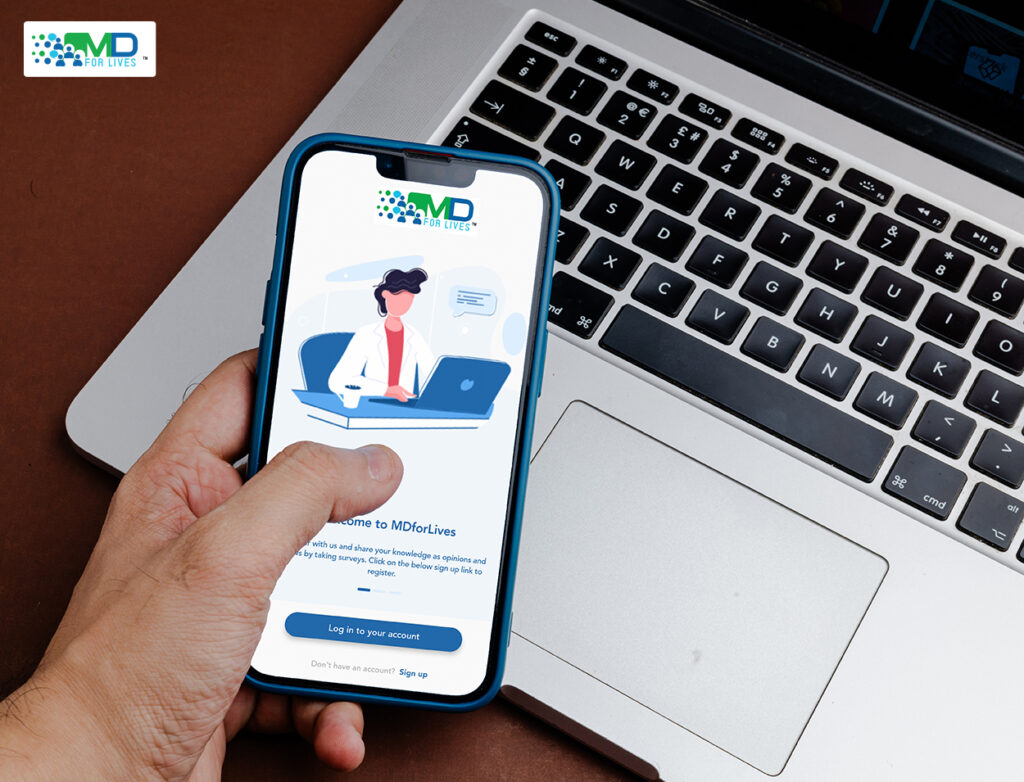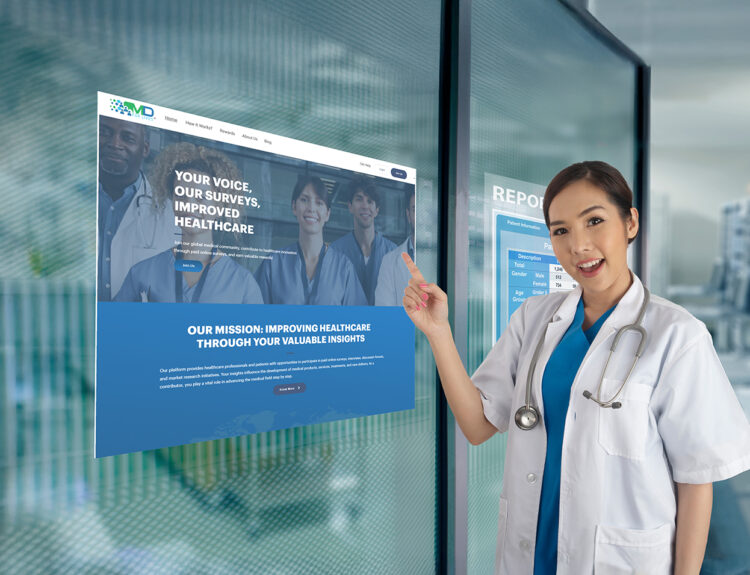Dr. Jones wraps up her third consultation just before 1 p.m. With most patients scheduled post-lunch, she has a quick 30-minute window before heading to lunch. She checks her phone. A notification: “New medical survey available. Estimated time: 22 minutes. Reward: $200.” It’s focused on anticoagulants, and she taps in.
Well, this is the new reality for many experienced doctors who are turning free time into solid earning opportunities with a medical survey. It isn’t just a generic medicine Q&A but is part of medical research studies designed to gather specialized clinical insights.
Healthcare and pharmaceutical companies increasingly rely on these insights to validate treatment plans, upgrade medical devices, and shape healthcare policies. In return, doctors earn fair compensation that respects their knowledge while contributing to decisions that could impact patient care worldwide.
So, the real question is no longer why doctors should consider paid health surveys. But, the real question is – WHY NOT?
5 Reasons Paid Medical Survey is Worth Every Doctor’s Time
Medical survey portals connect doctors with research opportunities that respect their expertise and schedule. These micro-earning opportunities allow doctors to leverage their clinical knowledge to benefit the healthcare industry in every way possible!
Here are five compelling reasons why doctors should consider participating in paid health surveys:
1. Offers a parallel revenue stream without much hard work

Doctors constantly provide valuable insights during conferences, training sessions, and clinical discussions but often without generous compensation. Paid health surveys change this equation by compensating doctors specifically for their clinical perspective.
Compensation typically ranges from $50 to $200 per survey, with specialists in high-demand fields like oncology or cardiology earning up to $300 or even more! This higher-income opportunity reflects the critical value of their insights for filling research gaps in complex treatment plans and patient responses.
A 2023 oncology research study highlighted this trend, showing how real-world clinical evidence is now critical for bridging the gap between trials and everyday practice. By collecting real-world data from practicing oncologists, EHRs, and institutes, researchers were able to better assess treatment effectiveness and monitor long-term outcomes.
Medical surveys efficiently gather this valuable firsthand experience from doctors, creating a simple income opportunity that respects their professional knowledge.
2. Influences healthcare advancements and patient care
Through medical surveys, doctors do far more than share insights, they actively shape the future of the healthcare industry.
In fact, a recent IQVIA paper revealed that 70% of healthcare companies report doctor feedback directly influences their decisions on drug launches and pricing strategies.
Some of the ways in which doctors are influencing different fields of healthcare are as follows:
- Pharmaceutical companies: By participating in medical survey, doctors can help pharmaceutical companies improve drug development by sharing real-world experiences with symptoms, treatments, and challenges.
- Insurance providers: Doctors’ survey feedback helps insurance providers understand how coverage decisions impact clinical timelines, leading to better-aligned health policies.
- Health technology firms: Health tech firms use survey insights from doctors to identify which digital tools can support care and fill gaps in traditional treatment plans.
These surveys give doctors a voice in shaping better decisions across healthcare without needing to directly connect with companies or step outside their clinical routine.
3. Sharpens clinical skills through new scenarios
Ever thought about how medical surveys could sharpen clinical thinking? These studies often go beyond basic questions, presenting complex scenarios or uncommon cases that don’t always appear in day-to-day practice.
This process acts like mental cross-training for doctors. Each case pushes them to think critically, revisit their diagnostic approach, and consider treatment options they may not typically use.
Over time, what does this really lead to? With regular participation, surveys become more than just a research activity. They offer a chance to reflect on clinical patterns, spot blind spots, and stay mentally agile.
4. Provides low-barrier entry medical research
Did you know that 97% of doctors never participate in clinical research? This isn’t from lack of interest but stems from practical barriers, such as minimal institutional support, time constraints, and unfamiliarity with research protocols. For doctors in community settings or smaller practices, the research world often feels entirely inaccessible.
But how to solve this issue and clear the gap? Well, medical survey solves this problem simply by creating a streamlined pathway to research. Without navigating complex IRB approvals, conducting time-intensive studies, or drafting formal papers, doctors can still make meaningful scientific contributions.
Surveys offer something many doctors are equally looking for: the intellectual satisfaction of advancing medical knowledge and ultimately improving lives.
5. Allows complete control over participation terms
What makes paid health surveys different from other research opportunities?
Well, for most doctors, it comes down to two things: flexibility and privacy. Unlike traditional research methods, these surveys let doctors decide when, where, and how they participate.
No scheduling headaches, no last-minute calls, no in-person sessions to squeeze into an already packed calendar. Since everything is digital, surveys can be completed from any device, often during a coffee break or between patient rounds and in as little as 10 to 30 minutes.
Even better, doctors will find tailored opportunities as per their specialty. That means every response is relevant, every minute well spent. Moreover, because participation is always opt-in and anonymous, doctors can share honest clinical feedback without worrying how it might be used or misinterpreted.
How Can Doctors Make the Most Out of Paid Medical Survey
Medical surveys are already designed to be rewarding. But with the right approach, they can become even more valuable.
Here are a few ways doctors can get the most out of every opportunity:
- Start by focusing on high-value surveys: The most impactful medical survey tend to match closely with a doctor’s specialty, experience, and clinical expertise. These aren’t just better paying but they’re more aligned with day-to-day realities.
- Choose a medical research platform with strong credibility: Not every survey platform meets the same standard. Some offer low-quality surveys, unclear compensation, or put professional integrity at risk. Trusted platforms like MDForLives ensure fair compensation, verified research, and a doctor-first experience.
- Keep the profile detailed and up to date: Survey matches depend heavily on the information shared in the professional profile. The more accurate the details, such as specialty, subspecialty, clinical focus, medical licenses, years of experience, the better the chances of receiving high-paying surveys. In fact, doctors should keep it updated in case their roles change.
- Check in often to avoid missing surveys: Many surveys close quickly once enough responses are collected. Logging onto the platform regularly and enabling notifications can help ensure no invitation slips by.
- Track participation like a passive income stream: Keeping an eye on completed surveys, time invested, and income earned can help doctors evaluate the value of their participation. This insight supports smarter decisions, like focusing on better-paying studies or scaling up survey activity based on availability.
Getting started is simple. All it takes is finding a reliable platform, setting up a strong profile, and staying active. The opportunities are out there – just waiting to match the right doctor with the right survey.
Your Expertise Deserves to Go Further Than Your Practice!

After years of treating patients, making tough calls, and navigating complexities in healthcare, doctors build a perspective that no trial or algorithm can replicate. That perspective is exactly what today’s healthcare research needs.
So, why are more and more doctors turning to paid medical survey? Because they offer a simple, flexible way to bring that real-world expertise into the decisions shaping tomorrow’s medicine.
In return, doctors get fair compensation, the opportunity to make a professional influence, and the satisfaction of knowing those insights don’t just sit in charts.
MDForLives makes it easy to get started. Every survey is carefully matched to a doctor’s specialty. Every response is confidential and valued. Moreover, every minute spent by doctors brings research one step closer to real-world relevance in healthcare.
Join MDForLives today and put your clinical voice to work where it matters most.
FAQs
-
What are paid medical surveys?
Paid medical surveys are part of healthcare research conducted by market research firms on behalf of pharmaceutical companies, to gather insights from practicing doctors. These surveys cover real-world clinical scenarios, treatment preferences, and feedback on medical tools.
-
How much do paid medical surveys for doctors compensate?
The income from paid doctor surveys varies with the topic, complexity, and the doctor’s area of expertise. Most surveys offer compensation ranging from $50 to $300, based on the focus of the research and the level of experience required.
-
How long do paid medical surveys take?
Most paid health surveys are designed while keeping in mind doctors’ packed schedules and typically take 10 to 30 minutes. They’re short enough to complete within the span of a single break or between patient cases, with no need to block out specific times between appointments.
-
Are MDForLives’ surveys legitimate?
MDForLives is a trusted platform used by over 1 million healthcare professionals globally. The platform adheres to strict data privacy laws like GDPR, ensuring all surveys are anonymized, while enabling advanced encryption to protect user information.
-
Do I need to pay to join a medical survey platform
No, reputable medical survey portals do not charge doctors to join or participate in medical research. Doctors are compensated for their time and insights but never asked to pay for access.
References:
- Harnessing real-world evidence to advance cancer research
https://pmc.ncbi.nlm.nih.gov/articles/PMC9955401/
- Why 97% of physicians don’t do research and the secret to site success
https://www.clinicalleader.com/doc/why-of-physicians-don-t-do-research-and-the-secret-to-site-success-000

MDForLives is a global healthcare intelligence platform where real-world perspectives are transformed into validated insights. We bring together diverse healthcare experiences to discover, share, and shape the future of healthcare through data-backed understanding.






